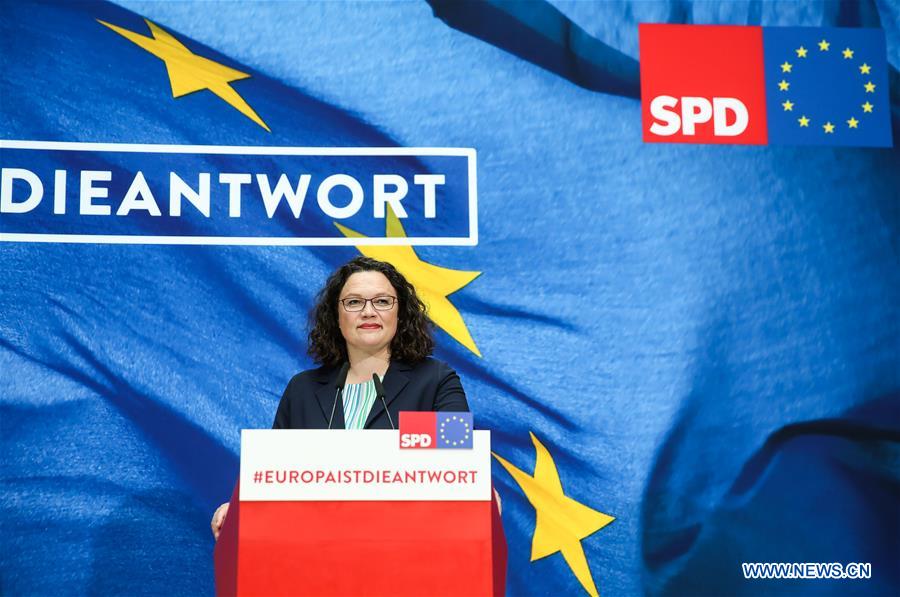
Andrea Nahles, leader of the German Social Democratic Party (SPD) attends a press conference at the headquarters of SPD in Berlin, capital of Germany, May 27, 2019. The German governing coalition parties, the Social Democrats (SPD) and the conservative union CDU/CSU, suffered significant losses in the European elections, according to the official results published by the European Parliament on Monday. (Xinhua/Shan Yuqi)
BERLIN, May 27 (Xinhua) -- The German governing coalition parties, the Social Democrats (SPD) and the conservative union CDU/CSU, suffered significant losses in the European elections, according to the official results published by the European Parliament on Monday.
The CDU/CSU, which campaigned together, remained the strongest force in Germany with 28.9 percent of the votes.
In the previous elections in 2014, however, when the two parties ran separately, the CDU alone achieved 30 percent of the votes.
"The CDU/CSU is about to lose its status as a people's party. It is red alert," said Carsten Linnemann, deputy leader of the CDU/CSU parliamentary group.
The CDU needed to finally end the process of stripping the party of its core content and "concentrate again on what we stand for and what we do not stand for," stressed Linnemann.
"We saw that the focus was on one topic, and that was the question of climate and environmental protection. And that is where we, even as a brand, were not able to convince at all," CDU Secretary General Paul Zimiak told the German public broadcaster ARD on Monday.
The German Social Democrats (SPD), the conservative union's coalition partner, also attributed their lack of attention to climate change as the reason for heavy losses in the elections.
"Climate protection or digitization - we are not on the square here," Lars Klingbeil, secretary general of the German social democrats, told ARD's Morgenmagazin.
The German social democrats got 15.8 percent of the votes on Sunday, almost 11 percent below the party's 2014 results.
"Trust has been lost for years. You cannot bring that back with a good law," said Klingbeil.
The German Green party improved significantly compared with the 2014 elections, ending up as the strongest political force with 20.5 percent of the German votes.
This was the party's best result since the start of the European Parliament elections in 1979, according to official data from the European Parliament.
The right-wing populist AfD achieved 11 percent of the votes, four percent more than in the 2014 elections.
The AfD did particularly well in eastern Germany, achieving results of between 17.7 percent in Mecklenburg-Western Pomerania and 25.3 percent in Saxony.
In the West of Germany, the right-wing populists received between 6.5 percent of the votes in Hamburg and 10 percent in Baden-Wuerttemberg.
The German liberal FDP gained 5.4 percent of the German votes, less than party leader Christian Lindner had wanted when he announced in January that the FDP wanted to "at least triple" its result of 3.4 percent in the 2014 European elections.
Voter turnout in Germany was 62 percent, which was significantly higher than five years ago when turnout was 48.1 percent.
In a joint statement, Manfred Weber, top candidate for the German conservative union and Markus Soeder, leader of the Bavarian CSU, praised the increased turnout in the elections, saying that "European democracy lives."
"Europe voted with a pleasingly high turnout - a clear vote for the EU," said Holger Bingmann, president of the Federation of German Wholesale and Foreign Trade (BGA).
"While the radical forces in Germany did worse than expected, in some other EU countries the right-wing populist forces were able to grow dangerously and will probably have more influence in parliament than ever before. These must be kept in check at all cost," stressed the BGA president.
"The clear majority in the European Parliament remains pro-European. The right-wing populists are not in a position to block politics for a strong Europe. The economy is relieved," said Dieter Kempf, president of the Federation of German Industries (BDI).
As the largest pro-European delegation, the German parliamentarians had a crucial role to play, stressed Kempf, because "German companies with strong exports in particular do not need anti-EU opinion leaders".
The BDI president called on the German government to "act more vigorously" to support the European Commission and European Parliament to "bravely" determine the EU's future course.
Clemens Fuest, president of the Institute for Economic Research (Ifo) called on the EU to "focus its economic policy on the provision of public goods where European action adds value."











